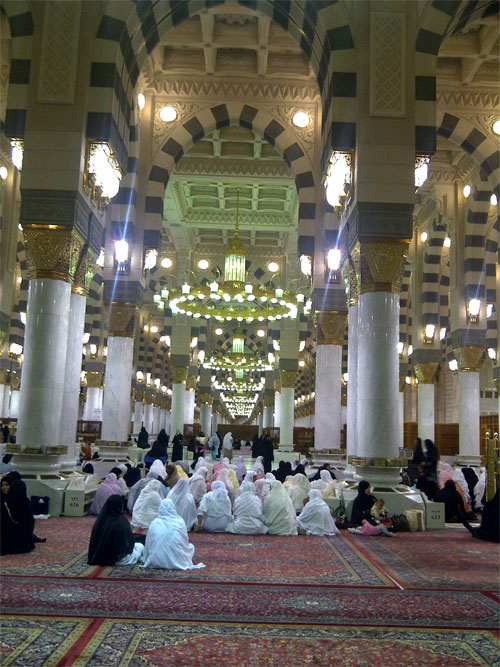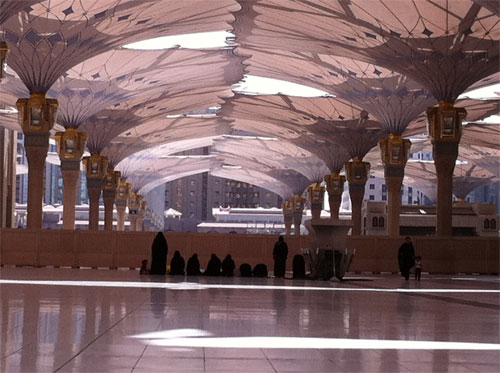Selepas 37 hari berada di Tanah Suci, mungkin catatan ini tampil bagai terlambat. Keberangkatanku buat kali pertama berstatus petugas haji ke Haramain sudah tentu mencatat sejarah tersendiri. Selepas diberi amanah selama 12 tahun sebagai pembimbing haji di tanah air, mungkin juga kesempatan seumpama ini kelihatan terlambat kerana mereka yang sekontemporari dan yang lebih junior terlebih dahulu menikmati perjalanan haji mereka hasil dari jerih payah mereka menyumbang bakti kepada jemaah. Hujung-hujungnya kita kena terima segalanya adalah rezeki dan ketetapan Allah jua. Allah jua Maha Mengetahui masa bila Dia akan pilih yang terbaik untuk kita menikmatinya.
Bila direnung sedalamnya, penantian 12 tahun yang baru kurasakan boleh dikatakan amat berbaloi dan digandakan Allah nikmat-Nya. Mungkin tidak mampu diungkapkan dengan perkataan dan segala ta'bir lisan pun akan kehabisan kosakata memperihalkannya. Pada catatan kecil ini, sebanyak mana pun yang mampu dihuraikan, bukan sahaja terlalu kecil, mungkin juga boleh mengurangkan kehebatan sebenar yang dialami. Hanya dengan dorongan untuk 'bini'mati Rabbika fahaddith', aku cuba untuk mengungkapkannya sebagai tanda kesyukuran dan satu usaha mendorong mereka sempat membacanya untuk mengikuti jejak langkahku jika ada yang layak diteladani.
Pada benak hatiku, boleh dikatakan baru kinilah benar-benar dirasakan buah kesabaran itu adalah kemanisan yang tiada terkata. Apa tidaknya ? Begitu banyak perkara berlaku tepat benar seperti yang diharapkan meskipun belum sempat dipohon dengan kesungguhan ke hadrat Ilahi. Nak dikata diri ini banyak amal soleh sehingga layak mendapat nikmat begini, rasanya masih jauh dari dikatakan cukup. Namun Allah Maha Pemurah. Belum pun terungkap sudah pun tertunai apa-apa yang dihajat.
Sejak awal pengelompokan para PIHTAS ( Pembimbing Ibadah Haji Tanah Suci), termaktub nama MADINAH pada kumpulan kami itu benar-benar mendatangkan rasa seronok. Sedarlah aku bahwa tugasan yang bakal dipikul ada bimbingan ibadah di Madinah. Bertemu dengan ahli kumpulan berpengalaman dan belum berpengalaman, namun terasa harmonis bersama, menambah keghairahan untuk berpadu tenaga di Madinah demi mencapai misi kemabruran haji untuk para jemaah. Kumpulan kami yang diterajui oleh Ustaz Abu Bakar Mohd Noor ( Melaka ) di penghujung kursus berjaya menonjolkan diri sebagai kumpulan terbaik. Kredit kepada semua ahli kumpulan ; Ustaz Mohd Faisal ( Melaka ), Ustaz Suhaimi ( Negeri Sembilan ), Ustaz Ramli ( Perlis), Ustazah Yaminah yang kami panggil sebagai Bunda ( Pahang ), Ustazah Rusmaizan ( Kelantan ), Ustazah Faridah ( Perak ) dan Ustazah Kunah ( Sabah ). Pada gilirannya, Ustazah Kunah tidak jadi bersama kami di Madinah dan diganti dengan Ustazah Salmah.
Bila akhirnya hari yang dinantikan tiba, satu lagi kejutan yang menggembirakan diriku adalah kesempatan mengerjakan umrah ke Makkah sebelum diberangkatkan ke Madinah. Tepat benar dengan harapan yang belum pun terungkap. Allah Maha Mengetahui apa yang diingini insannya yang kerdil ini. Sempatlah jua kami ke Makkah selepas melalui penerbangan 8 jam dan dan tertahan di Lapangan Terbang Antarabangsa Jeddah selama 4.5 jam. Kami tiba di Masjidil Haram pada pukul 3 pagi, 16 Sept 2012. Kami selesai saie dan bercukur tepat-tepat sebelum subuh. Oleh kerana kami akan berangkat ke Madinah, kami langsung menunaikan tawaf wada' setelah solat subuh.
Jarak berjalan kaki ke ibu pejabat rupanya cukup jauh juga sekitar 1000m. Pagi tadi kami tak sempat ke sana kerana kami minta drebar turunkan kami di Masjidil Haram.





